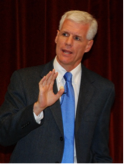Written by Shelly Read, Instructional Coach
Reflections from AAC Conference
While reading the newspaper last weekend I came across many references to math computation skills and the dropping test scores of Alberta students. The main concern identified was the lack of basic computation skills that students possess. While the articles made me shake my head more than once, let's be honest - teachers, parents and students have voiced similar concerns. A recent session I attended at the AAC Conference in Edmonton suggested a technique that teachers can use to help students strengthen their math skills and move towards automaticity and fluency.
Math Talks are frequent 10-15 minute lessons that help students build accurate mental math and computation strategies. Students are placed in small groups with a teacher to share problem solving methods, give one another feedback, and reflect on their own strategies. During Math Talks students do the thinking and the teacher listens, asks questions, and redirects as needed. While algorithms are useful strategies, pairing them with opportunities for small groups of students to talk about their successes and challenges improves overall understanding, so that the learning lasts. In schools where this ‘math community’ has been piloted teachers and students report higher levels of intellectual engagement.
In FSD I envision Math Talks being used to differentiate daily math lessons and as a powerful tool during RTI sessions. They allow students to apply the 7 mathematical processes, such as reasoning and communication, in a meaningful way. When designing lessons, these collaboration times can help students answer essential questions such as, “What is the most efficient strategy to use when solving a number operation question?”, “How can I best demonstrate my understanding of numbers?”, and “What are the qualities of an effective strategy?”
For further information about Math Talks check out the AAC website; very soon a math strategies section will be added under the Professional Learning tab. You could also read Crystal Morey’s article, Making Sense of Math Through Number Talks. Two books on the subject are Making Number Talks Matter by Ruth Parker and Cathy Humphreys and Number Talks by Sherry Parrish.
I am excited to give this thinking routine a try! I look forward to seeing eyes light up and I never tire of hearing our students say, “This actually makes sense!”
